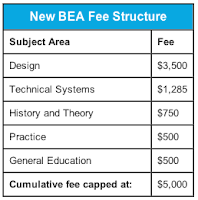For more information contact: Amanda Pica, NCARB Communications
Washington, DC - The National Council of Architectural Registration Boards (NCARB) recently approved for a new fee schedule for the Broadly Experienced Architect (BEA) Program, which provides an alternate path for U.S. licensed architects who do not hold a professional degree from an accredited program to fulfill the education requirement for NCARB certification.
Under the new structure, the fees will be capped at the current rate of $5,000 to avoid increasing the fee for individuals with deficiencies in multiple subject areas. Fees will be assessed only for the area of education deficiency determined through an education evaluation by the NAAB. Previously, applicants were required to pay the entire $5,000 BEA fee to resubmit any part of the dossier. In this new structure, the applicant will only be assessed the fee associated with the deficient subject area(s).
Washington, DC - The National Council of Architectural Registration Boards (NCARB) recently approved for a new fee schedule for the Broadly Experienced Architect (BEA) Program, which provides an alternate path for U.S. licensed architects who do not hold a professional degree from an accredited program to fulfill the education requirement for NCARB certification.
Under the new structure, the fees will be capped at the current rate of $5,000 to avoid increasing the fee for individuals with deficiencies in multiple subject areas. Fees will be assessed only for the area of education deficiency determined through an education evaluation by the NAAB. Previously, applicants were required to pay the entire $5,000 BEA fee to resubmit any part of the dossier. In this new structure, the applicant will only be assessed the fee associated with the deficient subject area(s).
“While the Council heavily subsidizes the BEA Program, it remains cost-prohibitive to an architect applying for certification through this path,” stated NCARB CEO Michael J. Armstrong. “This change will especially benefit applicants who have been unsuccessful in meeting all program requirements upon dossier review.”
About NCARB
The National Council of Architectural Registration Boards’ membership is made up of the architectural registration boards of all 50 states as well as those of the District of Columbia, Puerto Rico, Guam, and the U.S. Virgin Islands. NCARB assists its Member Boards in carrying out their duties and provides a certification program for individual architects.
NCARB protects the public health, safety, and welfare by leading the regulation of the practice of architecture through the development and application of standards for licensure and credentialing of architects. In order to achieve these goals, the Council develops and recommends standards to be required of an applicant for architectural registration; develops and recommends standards regulating the practice of architecture; provides to Member Boards a process for certifying the qualifications of an architect for registration; and represents the interests of Member Boards before public and private agencies. NCARB has established reciprocal registration for architects in the United States and Canada.
About NCARB
The National Council of Architectural Registration Boards’ membership is made up of the architectural registration boards of all 50 states as well as those of the District of Columbia, Puerto Rico, Guam, and the U.S. Virgin Islands. NCARB assists its Member Boards in carrying out their duties and provides a certification program for individual architects.
NCARB protects the public health, safety, and welfare by leading the regulation of the practice of architecture through the development and application of standards for licensure and credentialing of architects. In order to achieve these goals, the Council develops and recommends standards to be required of an applicant for architectural registration; develops and recommends standards regulating the practice of architecture; provides to Member Boards a process for certifying the qualifications of an architect for registration; and represents the interests of Member Boards before public and private agencies. NCARB has established reciprocal registration for architects in the United States and Canada.
